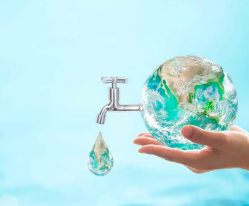How to save water
1. First, the taps
Check all of your taps in the kitchen and bathroom. If one is leaking, check if it is enough to replace the gasket or if it is better to buy a new one. Even if only one tap in your home is dripping water, it is wasteful. These drops add up to many litres of wasted water every day, week, or month. In principle, this also applies to the garden hose and the toilet. The latter is often a problem. The red stains you often see in the bowl (which are a nightmare to clean) form when there is a leak in the toilet and the water flows in a small trickle constantly.
2. Second, limit showers
Someone once counted how much water is used for an average shower. It turns out to be 15 to 30 litres of water per minute! That's a lot of water. And although it is a great pleasure, especially after a hard day or physical work, it is worth doing something good for the earth and shortening this pleasure by half. By doing this you will still have enough time to wash yourself properly, but you will be aware that you have done something good. It is similar with baths. An average bathtub is around 200 litres. Let's say you pour only half of this; 100 litres, just to sit in a bubble bath. It is much less than a shower, but it is worth considering whether it is really a necessary part of your life. Maybe you are able to limit this pleasure to one day a week?
3. Third, turn off the water
Do you brush your teeth and keep the water running? You want to take a shower, so you run the water first to warm it up? Do you wash by hand, although you have a dishwasher? How many times is the tap water running for no reason? Or rather for no good reason? You probably don't realize it right now, but pay attention to it and you'll find that it is more common than you think. Start looking after yourself and your loved ones. You will save not only water, but also money.
4. Fourth, the dishwasher
A dishwasher is a great device that saves time and water. This does not mean, however, that it does not consume it at all. It turns out to be up to 75 litres for each wash. Therefore, remember to only turn it on when it is full. The dishwasher will not take less water because it is partially empty. So it is better to fill it up before using. The same applies to the washing machine, it is better to do the laundry less often, but with a full load, than to wash a few things every day. Apparently it is also the case that a washing machine with too few things washes worse than one that is full to the brim.
5. Fifth, if you wash something in the sink
If you need to wash a dish in the sink, or prepare vegetables for soup, don't do it under the flowing water. Pour water into the sink and wash what you need there.
6. Sixth, you need to water your lawn less often
I know it's hard to watch your garden deteriorate and your grass turn yellow and become more like hay. Unfortunately, watering consumes a lot of water. Many countries with a really difficult hydrological situation even prohibit watering lawns in summer. There are high penalties for breaking this rule. However, if you do decide to water, do it once and properly. If you water just a little the water will evaporate quickly. However, if you water it deeply, thoroughly and for a long time, the water will soak deep into the roots and keep the grass in a good condition for a long time.
7. Seventh, make friends with a broom
If you live in a house, I’m sure you wash your driveway or sidewalks with water to keep them clean. These activities waste huge amounts of water. It is better if you sweep everything up. It is a much more tiring and dirty method, but definitely ecological.
8. Eighth, wash your car less often
Nobody likes a car so dusty that you can draw or write on it with your finger. However it is best if we keep washes to a minimum. Whether it's a manual or automatic car wash, it uses thousands of liters of water just to keep your car shiny until the next rain ...
9. Ninth, look at what you buy
If you intend to replace your washing machine or dishwasher in the near future, remember to pay attention to how much water they use. Sometimes it is better to pay more and have energy-saving equipment alongside using much less water. Thanks to this, in the future you will not only do something good for the world, but also save money, because the investment will definitely pay off.
10. Tenth, take care of your clothes
While this may seem unsanitary, some garments do not need to be washed after each wear. Jeans, tracksuits (as long as you do not exercise in them), jackets, coats, scarves, hats, skirts, you can wash less often. Thanks to this, you will not only save water, but also protect your clothes from quick damage, because frequent washing accelerates the wear and tear on clothes.
11. Eleventh, collect water
If you have a garden, you can try to collect rainwater. This is an old method from the 18th century and earlier, but very effective in collecting water for garden watering. It will probably take some time to collect enough water to water your plants, but it is worth trying to save water.
12. Twelfth, don't let the water evaporate
If you are one of the lucky ones who have a pool, even an inflatable one, remember to keep it covered when not in use. This will prevent the evaporation of water, which would then need to be refilled.
13. Thirteenth, use the same water twice
For example, the water you use to wash the fruit can be used afterwards to water the flowers. Place some utensils under the tap, collect the water and use it later to water flowers or wash the vegetables. There are many situations where water used for an activity can be reused.
There are many simple ways to save water, but we are not yet trained to pay attention to them on a daily basis. It is worth taking care of changing habits in everyday life. Small steps taken by many people will give great results.



